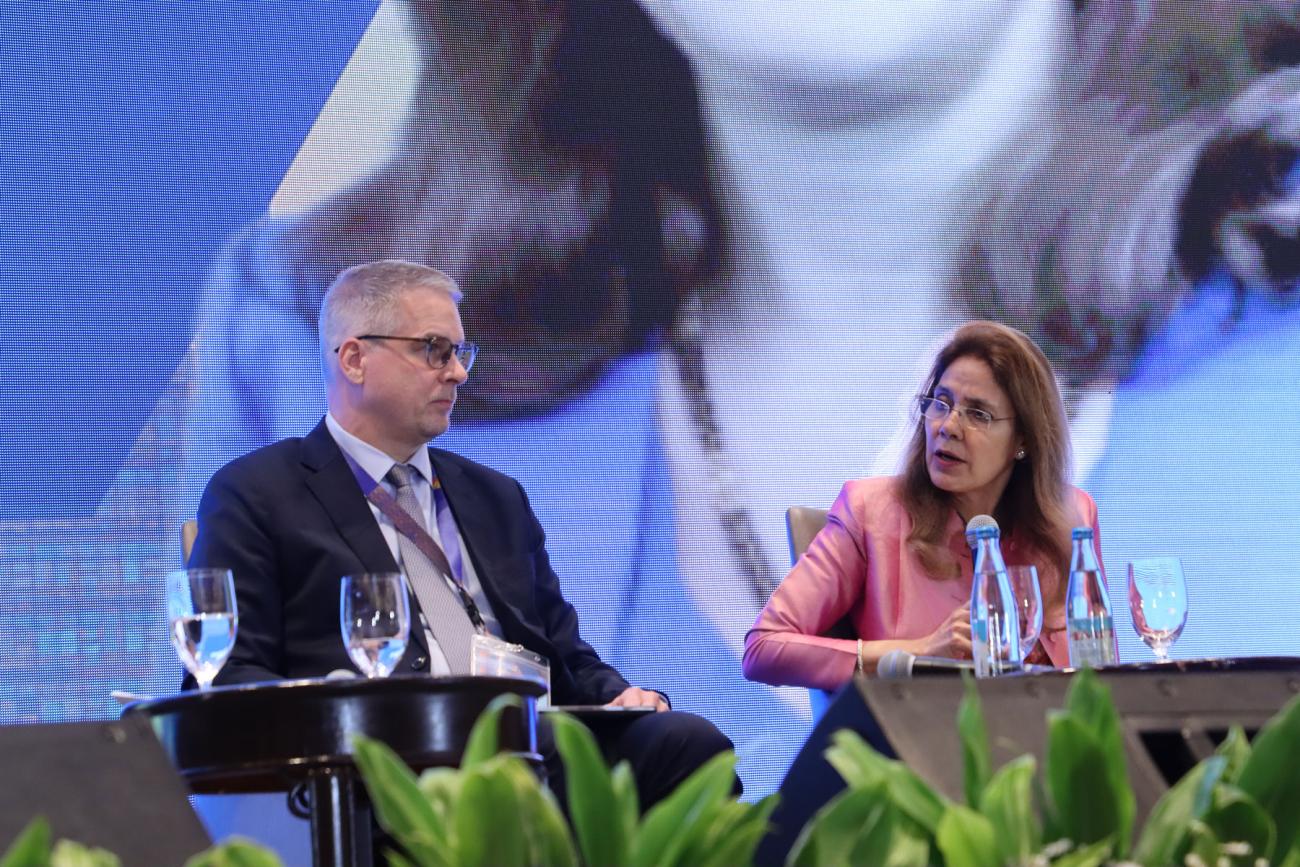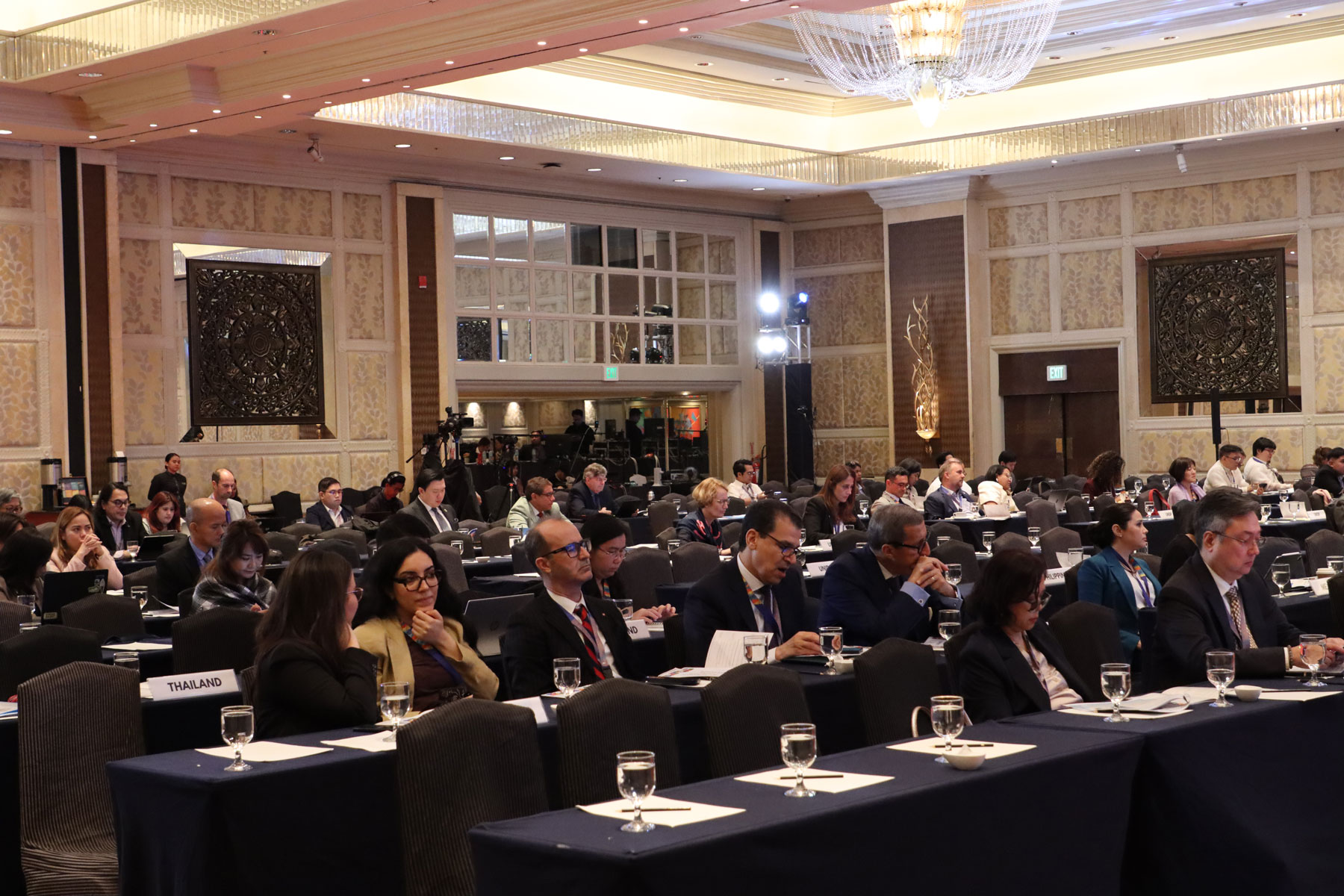Innovative UN approaches to support Middle-Income Countries showcased at high-level conference

MANILA, PHILIPPINES – Representatives from 19 countries gathered in Manila from 28 to 29 April for the High-Level Conference of the Like-Minded Group of Middle-Income Countries, organized by the Government of the Philippines with the support of the United Nations. The conference included discussions on innovative ways to support middle-income countries (MICs) and their key role in driving sustainable development.
Scaling innovative approaches for UN support for MICs
The Conference noted that over 100 countries are classified by the World Bank as middle-income, with Gross National Income per capita between $1,146 and $14,005. They account for around 75 per cent of global population, 60 per cent of the world's poor and one-third of global gross domestic product (GDP).
Since 2000, only 27 countries have transitioned from middle-income to high-income status. Many of them experienced reversals back to the middle-income level, with 11 countries switching back and forth at least once before reaching their current high-income status. In fact, the Conference recognised that middle-income countries experience frequent growth slowdowns and, if left unaddressed, this loss of economic dynamism can cause countries to get stuck in what is referred to as the "middle-income trap." Member States of this like-minded group stress that middle-income countries continue to face specific challenges related to, inter alia, high levels of inequalities, low growth, persistent poverty, unemployment, loss of biodiversity, the adverse effects of disaster risks and climate change, reliance on primary commodity exports, high levels of external debt and the volatility of exchange rates and capital flows, and the digital divide.
Speakers at a panel entitled "New Generation Partnerships with the UN Development System", including David McLachlan-Karr, Regional Director for Asia-Pacific at the UN Development Coordination Office, highlighted how the UN has re-oriented its respective in-country development frameworks to address their evolving needs.
"Middle-Income Countries are vital engines for global development, and they face complex, evolving challenges that require equally dynamic and tailored support," he said. Therefore, we need solutions tailored to these countries' diverse realities.
He added that the future of the UN’s support to MICs is built on a new generation of partnerships that are strategic, catalytic and fully aligned with national needs and priorities.
These approaches include support to national leadership and amplifying country-driven initiatives, as well as advancing innovative solutions in financing, climate resilience, and inclusive growth with Resident Coordinators as enablers of these pathways to sustainable development.
"There has recently been more clarity in terms of the role of the Resident Coordinators in positioning the UN system in strengthening coordination," said Maria Teresa Almojuela, Assistant Secretary of the Office of United Nations and International Organizations at the Philippines Department of Foreign Affairs, who moderated the panel. “A united proposition from the UN increases effectiveness of support.”

Shifting perspectives in development support
Traditionally, the UN has provided official development assistance to support developing countries, including MICs. But as the development needs of these countries become more complex and diverse, the UN has transformed its approach by focusing more on integrated policy advice, innovative financing, and strengthening institutions.
Neville Gertze, Namibia's Permanent Representative to the United Nations in New York, highlighted that Namibia is an example of such a partnership.
“That relationship of an aid model is no longer the case [for Namibia]. Today, we have a very strategic partnership of cooperation with the UN on the ground that enables us to develop our own capacity with the help of the UN systems,” Ambassador Gertze said. Namibia has sub-Saharan Africa's eighth highest per capita GDP, around five times higher than that of Africa’s least developed countries. However, inequalities persist, and the majority of the population is still engaged in subsistence agriculture. Supporting Namibia's efforts to lift them out of poverty is a key target of the UN’s Cooperation Framework in the country.
McLachlan-Karr emphasised the importance of making full use of the Cooperation Frameworks as a way of rethinking engagement with MICs and moving towards transformational, rather than transactional, partnerships.
Leveraging unified development approaches for MICs
Embedding national priorities in the Cooperation Framework highlights the crucial role of the UN development system in supporting MICs, said UN Resident Coordinator in Indonesia, Gita Sabharwal.
“We are only as effective as the partnerships of trust that we foster. These broad-based partnerships are what MICs need in becoming developed nations, and the Resident Coordinators must stand at the heart of those,” she said.
Dirk Wagener, UN Resident Coordinator in Fiji, Solomon Islands, Tonga, Tuvalu and Vanuatu, highlighted the diverse nature of MICs, including those in the Pacific, which are also classified as Small Island Developing States (SIDS) with unique challenges.
“Pacific middle-income countries face a development paradox: while income-based metrics classify them as middle income, the realities on the ground reveal acute vulnerabilities,” he said. “These countries remain highly exposed to climate change impacts and natural disasters, compounded by geographical isolation and limited economic diversification.”
Regional solutions for shared challenges
Middle-Income Countries are strengthening cooperation among themselves and offering increasing resources under a model called South-South and Triangular Cooperation (SSTC), which is expected to become increasingly important given the reduction in development support from traditional donors of the global North.
Brian Wallace, Permanent Representative of Jamaica to the United Nations in New York, said SSTC benefits all those involved and the wider multilateral system.
“Certainly, one area of SSTC is advocacy — on the strengthening and stable resourcing of the UN development system,” he said.
At the Conference’s conclusion, delegates from the Like-Minded Group of Middle-Income Countries adopted the Makati Declaration on Middle-Income Countries, which commits to advancing the elaboration of a Strategic Programme of Action (SPOA) for middle-income countries, inclusive of concrete proposals to reform the development financing architecture for Middle-Income Countries and building on the commitment in the Rabat Declaration towards the implementation of the 2030 Agenda for sustainable development.
More information about the conference is, available on UN News.
ADDITIONAL RESOURCES
Presentation at the High-Level Conference of Middle-Income Countries on philippines.un.org.
Compilation of stories demonstrating the work and impact of the United Nations in middle income countries on philippines.un.org.













